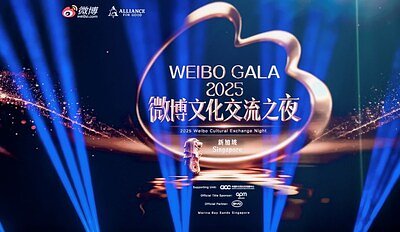
Weibo's Singapore Event Signals Broader Push for Cultural Exchange and ESG Commitment
Weibo's 'Cultural Exchange Night' in Singapore, timed with a key diplomatic milestone, highlights a growing trend of social media platforms facilitating international relations and embracing social responsibility.
Weibo's Singapore Event Signals Broader Push for Cultural Exchange and ESG Commitment
SINGAPORE – November 17, 2025 – Weibo, the leading Chinese social media platform, hosted its 'Cultural Exchange Night' in Singapore on November 16th, coinciding with the 35th anniversary of diplomatic relations between China and Singapore. While presented as a celebration of cultural ties, the event reveals a broader strategy by Weibo to expand its international influence and position itself as a champion of social responsibility, even as it navigates a competitive landscape and differing expectations for digital diplomacy.
Beyond Entertainment: A Digital Diplomacy Play
The event, attended by over 1,000 guests including celebrities, athletes, business leaders and philanthropists, wasn’t simply a lavish party. It’s a calculated move by Weibo to leverage its platform for what analysts are calling “digital diplomacy.” “Social media companies are increasingly recognizing their potential as unofficial ambassadors,” says one source familiar with Weibo’s international strategy. “By hosting events like this and fostering cross-cultural dialogue, they’re subtly shaping narratives and building goodwill.”
However, Weibo isn’t the undisputed king of social media internationally. While it boasts roughly 600 million monthly active users, it trails behind global giants like Facebook, Instagram, and TikTok, and even WeChat within China itself. “Weibo has to differentiate itself,” explains a technology analyst based in Singapore. “Simply being another social media platform isn't enough. They’re betting on a combination of curated events, celebrity influence, and a focus on cultural exchange to carve out a niche.”
The timing of the event, coinciding with the 35th anniversary of China-Singapore diplomatic ties, is no coincidence. It underscores the strategic importance of the relationship between the two countries and Weibo's alignment with broader geopolitical objectives. “It’s a clear signal that Weibo recognizes the significance of this partnership and wants to be a part of strengthening those ties,” one observer noted.
A Commitment to Social Responsibility – Or Just Good PR?
A key component of the event was the debut of Weibo's new ESG (Environmental, Social, and Governance) ranking. While details surrounding the methodology remain sparse, the move signals a growing awareness of the importance of social responsibility among social media companies. The pressure is mounting on platforms to address issues like misinformation, privacy, and harmful content, and to demonstrate a commitment to sustainability.
However, skepticism remains. Some analysts question the authenticity of Weibo’s commitment, suggesting it may be more about public relations than genuine change. “ESG rankings are becoming increasingly common, but it's crucial to look beyond the headlines and examine the actual practices,” says a CSR consultant. “Many companies are guilty of ‘greenwashing’ or ‘social washing’ – making claims that aren’t backed up by evidence.”
Currently, the specific criteria and methodology behind Weibo’s ESG ranking are not publicly available. This lack of transparency raises questions about its credibility and comparability to established ESG ratings from independent agencies. While it's possible this is a new initiative still under development, the absence of detail fuels speculation that the ranking is primarily a marketing tactic rather than a robust assessment of social and environmental impact.
Navigating a Crowded Landscape
Weibo isn’t alone in recognizing the power of social media for cultural exchange and global engagement. Platforms like TikTok, Instagram, and YouTube are all actively fostering cross-cultural dialogue, albeit through different approaches. TikTok, for example, relies heavily on user-generated content and viral challenges, while Instagram emphasizes visual storytelling and community building.
What sets Weibo apart is its curated approach and its focus on fostering official diplomatic ties. While TikTok and Instagram are primarily driven by organic content, Weibo’s ‘Cultural Exchange Night’ represents a more deliberate attempt to shape narratives and build goodwill through high-profile events and celebrity endorsements. “Weibo is trying to position itself as a bridge between cultures, but it has to compete with platforms that already have a massive global reach,” one digital marketing expert explains. “They need to find a unique value proposition that resonates with audiences beyond China.”
Furthermore, the event highlights the increasing importance of localized strategies. By choosing Singapore as a location, Weibo is tapping into a regional hub with strong ties to both China and Southeast Asia. “Singapore is a strategic location for Weibo,” says a source close to the company. “It’s a gateway to the ASEAN market and a key partner for China’s Belt and Road Initiative.”
The event represents a strategic move by Weibo to expand its international presence and position itself as a key player in the digital diplomacy arena. Whether it can successfully navigate a crowded landscape and establish a unique value proposition remains to be seen.
